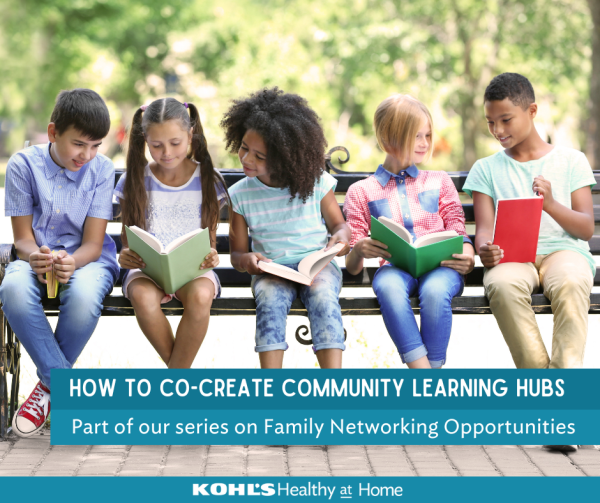February 23, 2023
How to Co-Create Community Learning Hubs
Part of our series on family networking opportunities
español | English
Schools are first and foremost a place where discovery and learning happen, so why not extend the joy of teaching and learning to the adults in your community? Turn your school into a community learning hub, hosting small group learning opportunities where families can connect around shared interests. A small group setting makes it easier to build deeper relationships with others, and even one friendly face can make school feel more welcoming. Read on to learn how to extend learning opportunities to the adults in your community.
Let Families Lead
The school’s role in this networking opportunity should be to support and hold the physical (or virtual) space for families to gather. Consider the following while planning your community learning hub:
- Family-led learning is best. Identify who can lead the groups, and secure funds to provide a stipend for their time.
- Designate staff to open a meeting room or keep time as needed.
- Be thoughtful about whether staff should participate, or if families will be more comfortable without staff engaging.
- Lay the foundation for families to feel comfortable approaching school staff about their ideas. Do you have a designated family liaison, or an example of a community-led club that can inspire others to share their ideas?
Below, you’ll find a few ideas for learning topics that can be tailored to your community.
1. Book Clubs
Book clubs can be as unique as your community. Try these strategies to start reading and talking:
- Poll the community to identify a book that families are interested in. (Remember to include reading for fun!)
- Choose one book or split into groups based on votes.
- Most local libraries do a monthly universal read, where a title is available as an eBook or audiobook with no wait time. Consider collaborating and promoting that book.
- Remember your community’s cultural assets – if your community has many Spanish speakers, provide the choice of meeting to discuss the book in Spanish and other languages!
- Create small groups that stay consistent throughout the school year to build deeper relationships, or shuffle groups with each new book or chapter to encourage new connections.
2. Language Learning Exchange
Assess the opportunities your school community holds for teaching and learning new languages. According to the U.S. Census Bureau, U.S. residents speak more than 300 languages! It’s likely that your school community has speakers of many languages who may be excited to share their knowledge and skills. Host language exchanges for folks to practice speaking, or host learning circles for beginners to study new languages and connect with the different cultures in your community.
3. No- to Low-Prep Small Group Learning
If you find that families are intimidated by book clubs or language exchanges, choose an option that requires less pre-work:
- Host a film club each month in the gymnasium or an outdoor space, with an opportunity for discussion.
- Use your school garden as a place for families to learn about gardening at home, nutrition, and their local ecosystem. If you don’t have a school garden yet, you could involve a group of families in starting one.
- Get moving. Ask a community member to host a dance class. Can you explore various styles of dancing each month?
Healthier Generation Is Here to Help
With the right foundation, small-group learning will grow from any of your family events.
Next week, we’ll dig into ways to engage families asynchronously through virtual platforms. In the meantime, discover how to implement our other family networking opportunities:
Stay inspired by new ideas and learn from our catalogue of success stories, tips, and evidenced-based trainings for school staff from Kohl’s Healthy at Home.


